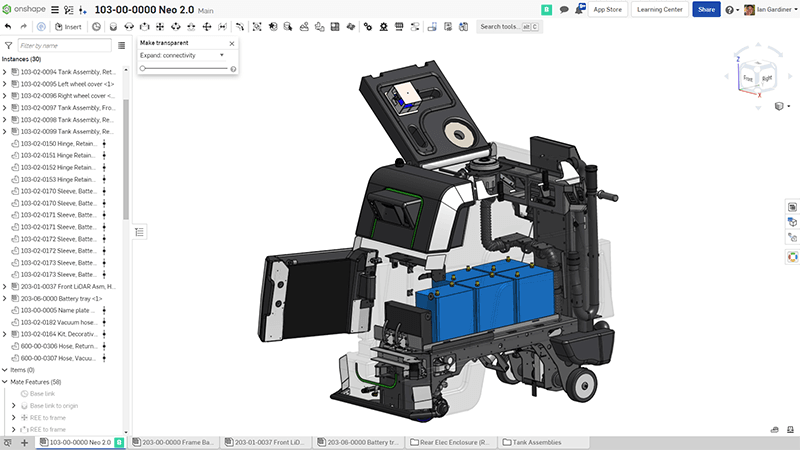The Neo 2 represents the eighth-generation of Avidbots’ sanitation robots. The latest iterations have focused on improving Neo’s cleaning abilities and further enhancing its autonomy.
“Our technology for obstacle avoidance is something that's unique in the industry and really is our key differentiator in the market,” says Ian Gardiner, Senior Mechanical Engineering Specialist in Mechatronics Engineering. “Floor cleaners have been around for decades. We’re not inventing the form of the floor cleaner; we’re inventing the autonomy of the floor cleaner.”
According to Gardiner, the challenge of sharing updated product design data across their internal departments and external partners has historically been more challenging than the mechanical engineering tasks themselves.
“Our design team is working on improvements every day. We know what we want to build. Our challenge has been communicating rapid iterations across the organization.” he says. “And not just in our local facility, but across a set of teams that are distributed worldwide because we also work with partners.”
“We eventually want to securely share product data, part numbers and build specifications globally. Internally, we have our purchasing, manufacturing, service and customer support teams. Externally, we have vendors and service partners. They need accurate, current and historical data to do their best work. One reason for moving to Onshape was to facilitate that collaboration and that sharing of our data,” Gardiner adds.
The Avidbots product development team switched to PTC’s Onshape cloud‑native product development platform in early 2020 after being frustrated by how their file-based on-premise CAD system was slowing down communication.
“Email and spreadsheets were our typical way of sharing information, but with these older CAD systems, a lot of your data gets buried within the system. You have to purchase extra licenses and/or add-ons to make CAD available to people,” he recalls. “So we would export PDF drawings and put them into folders that people could access. But these are disconnected from the real models that are being developed day by day. Half our team’s time used to be spent constantly reproducing and updating changes.”
Onshape’s real-time data management provides one single source of truth for product designs across the organization. Whenever one member of the team makes a change, everyone else can instantly see it. A comprehensive Edit History tracks who made what change and when, allowing teams to return to any prior state of the design process if desired. In addition, Onshape’s Sharing feature allows design teams to instantly share CAD models with other departments or outside partners with just a web link.
“With Onshape, our collaboration process is much more fluid and allows everyone more direct access to the CAD models,” says Gardiner. “It frees us up to focus on our highest value tasks which are solving design challenges like the best way to capture squeegee water. We can’t leave any streaks on the customers’ floors.”
Beyond Scrubbing Floors: Future Applications
 04.04.2025What’s New: AI Advisor, Sketch Constraint Manager, Match Scene Properties in Render StudioLEARN MORE
04.04.2025What’s New: AI Advisor, Sketch Constraint Manager, Match Scene Properties in Render StudioLEARN MORE 04.04.2025What’s New: AI Advisor, Sketch Constraint Manager, Match Scene Properties in Render StudioLEARN MORE
04.04.2025What’s New: AI Advisor, Sketch Constraint Manager, Match Scene Properties in Render StudioLEARN MORE















